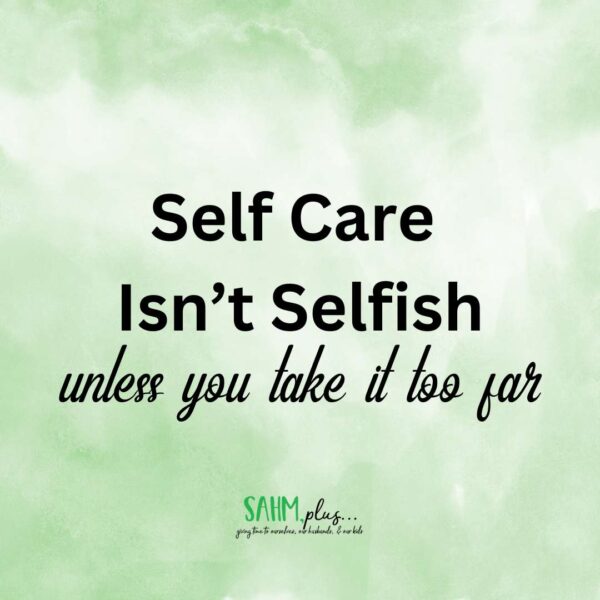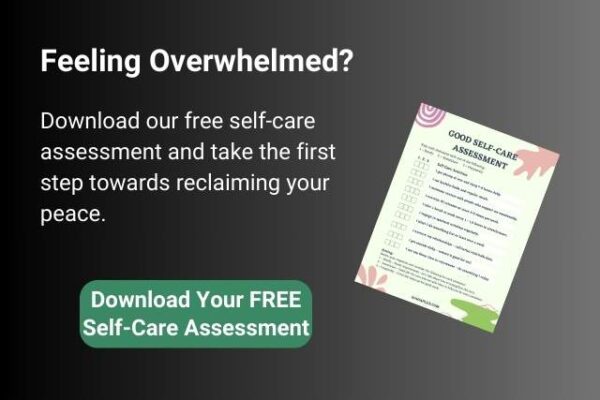We all know that self-care is crucial, especially when we’re constantly giving to others. But today, I want to talk about something we don’t often hear about: when self-care goes too far. Take it from me … these are some bad self care habits to avoid otherwise they can turn toxic.

The Allure of More Me Time
A couple of years ago, I found myself deep in the throes of perimenopause (coupled a midlife crisis) that nearly destroyed my marriage and really hurt my relationships with my kiddos. My body was changing, my emotions were all over the place, and I just felt… lost.
Self-care seemed like the answer to everything.
So, I threw myself into it with full force—tons of books, fewer outings with my family, and less interest in date nights or activities I previously enjoyed with my husband.
At first, it was amazing. I finally felt like I was taking care of myself after years of putting everyone else first.
But here’s where things took a turn.
When Self-Care Becomes Selfish Care
The more “me time” I carved out, the more I wanted. I started to resent interruptions—whether it was my kids wanting to play games or my husband wanting to spend time together. I found myself withdrawing from my family because I craved that sense of peace and solitude more and more. I convinced myself that this was all part of a healthy self-care routine, but in reality, I was isolating myself.
Looking back, I realize that I was dealing with something much deeper. Perimenopause had me on an emotional rollercoaster, and instead of facing it head-on, I used self-care as an escape. It wasn’t really self-care anymore; it was a way to avoid dealing with my feelings, my family, and the changes happening in my life.
The Impact on My Relationships
I began to notice that my relationships with my husband and kids were suffering. My kids felt like I was always too busy for them, and my husband started to feel disconnected from me. The very things I was trying to nurture with self-care—my health, my peace of mind—were slipping away because I was neglecting the people who mattered most.

Other Bad Self-Care Habits to Watch Out For
Self-care can sometimes turn into habits that do more harm than good. Here are a few others to be mindful of:
1. Overindulging in Comfort Foods
While treating yourself to your favorite snacks or comfort foods can feel like self-care, doing it too often can lead to unhealthy eating habits. Emotional eating can become a crutch, leading to weight gain, guilt, and even more stress, creating a vicious cycle.
2. Retail Therapy Gone Wrong
Shopping can be a fun way to relax and treat yourself, but when it turns into retail therapy, it can quickly spiral out of control. Over-spending in the name of self-care can lead to financial stress, buyer’s remorse, and clutter, which only adds more chaos to your life.
3. Avoiding Physical Activity
Sometimes, self-care can be mistaken for resting or lounging around all day. While relaxation is important, avoiding physical activity altogether can negatively impact your health. Exercise is a crucial part of self-care, helping to reduce stress, improve mood, and boost energy levels.
4. Isolating Yourself
Taking time to be alone is essential, but when self-care turns into complete isolation from friends and family, it can lead to loneliness and depression. Social connections are important for mental and emotional health, and balancing alone time with meaningful interactions is key.
5. Binge-Watching TV
Catching up on your favorite shows can feel like a great way to unwind, but spending hours on end in front of the screen can be draining. Binge-watching can lead to sleep deprivation, decreased productivity, and even more stress in the long run.
6. Using Alcohol or Substances as Self-Care
Having a glass of wine to unwind is one thing, but relying on alcohol or other substances as a form of self-care is a slippery slope. It can quickly become a habit that negatively impacts your physical health, mental clarity, and relationships.
7. Neglecting Responsibilities
Sometimes, self-care can be used as an excuse to procrastinate or avoid responsibilities. While taking a break is necessary, constantly putting off important tasks can lead to increased stress and anxiety when those responsibilities inevitably catch up with you.
8. Ignoring Mental Health Needs
Self-care isn’t just about pampering yourself; it’s also about taking care of your mental health. Ignoring signs of stress, anxiety, or depression under the guise of “self-care” can prevent you from getting the help you really need.
9. Using Self-Care as a Justification for Unhealthy Habits
It’s easy to justify bad habits by labeling them as self-care. Whether it’s staying up too late, spending too much time on social media, or indulging in guilty pleasures that leave you feeling worse afterward, it’s important to recognize when these habits are doing more harm than good.
Finding Balance: Healthy Self-Care vs. Escapism
I had to take a hard look at my self-care routine and recognize that I had gone too far. Self-care should never be about escaping your life; it should be about enhancing it. That meant scaling back on the endless “me time” and finding ways to include my family in activities that nurtured all of us. I started prioritizing quality time with my kids and husband, and guess what? That became a form of self-care too.
A Few Tips to Keep Self-Care in Check
- Set Boundaries: It’s okay to say no sometimes, but make sure your self-care isn’t pushing loved ones away.
- Include Your Family: Sometimes, self-care can be a family walk, cooking a healthy meal together, or just having a movie night.
- Be Mindful of Your Emotions: If you find yourself craving more and more alone time, it might be worth exploring what’s really going on beneath the surface.
- Balance is Key: Make sure your self-care routine includes activities that nurture both your body and your relationships.
Self-care is essential, but it’s also important to recognize when it starts to become an unhealthy escape.
Finding that balance isn’t always easy, especially when you’re dealing with hormonal changes or the stress of midlife. But by staying mindful and keeping an eye on how your self-care habits affect those around you, you can create a routine that truly supports your well-being—and your relationships.
Remember, taking care of yourself should help you be more present and connected, not less. So, let’s keep self-care in a healthy place, where it uplifts both you and the people you love.
If you’ve ever found yourself struggling to find the right balance in your self-care routine, my Self-Care Worksheet can help you assess where things might be going off track. It’s designed to guide you in identifying areas where you need more balance and where you might be overindulging. Then, use my Self-Care Planner to create a routine that supports your well-being without overwhelming your relationships or responsibilities.

